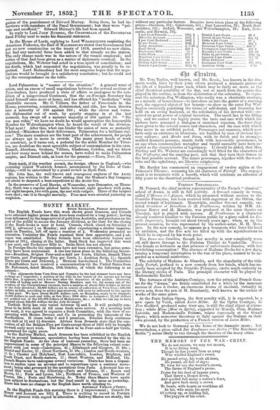FOREIGN Tardernicar..s.
M. Ponsard, the chief modern representative of the French "classical" school of drama, is still in full activity. A five-act comedy in verse, called L'Eanune et 1 'Argent, which he presented without success to the Comedic Francaise, has been received with eagerness at the Odeon, the second temple of legitimacy. Meanwhile, another five-act comedy, en- titled Grandeur et Decadence de M. Prudhoninte, written by MM. Al- phonse Royer and H. Monnier, was produced at the same theatre on Tuesday, and is played with success. M. Prudhonune is a character already rendered familiar to the Parisian public by a piece called La Ta- male Improvisee, brought out about twenty years ago ; when, as on the present occasion, he was represented by the author-actor, M. H. Mon- nier. In the new comedy, he appears as a bourgeois who loses his head by ambition, and the five acts are filled up with the eaystifications ta which he is exposed by hie weak point.
The Dame aux Camillus, though her novelty is now completely worn off, still draws throngs to the Parisian Thiatre du Vaudeville. Never was female so fortunate as that princess of unfortunate females, with her bewitching consumption! Tho absence of Madame Doche for a few days, causing a temporary interruption to the run of the piece, seemed to be m- gardedas a national misfortune.
• The celebrity of Madame de Girarclin, and the singularity of the title Lady Tartufe, prefixed to a new comedy from her hands, which has re- cently been accepted by the Comedie Francaise, excite much curiosity in the literary circles of Paris. The principal character will be played by Mademoiselle Rachel.
The fortunes of the Ambigu-Comique, now the principal French thea- tre for the "drama," are firmly established for a while by the immense success of Jean le Coeher, an enormous drama of incident., virtually in. seven acts, from the pen of M. Bouchardy, well known as the author of works of the same genre.
At the Paris Italian Opera, the first novelty will, it is expected, be a new opera by Verdi, called Lulea Miller. At the Opera Comique La Pere Gaillard, produced some time ago, is still the chief object of adrac- tion • while Meise (Mose in Egitto), supported by Morelli, Obin, Madame Laborde, and Mademoiselle Poinsat, reigns supremely at the Grand Opera ; which moreover threatens to fight against the Italians on their own ground, by the production of a French version of Luisa Miller.


























 Previous page
Previous page